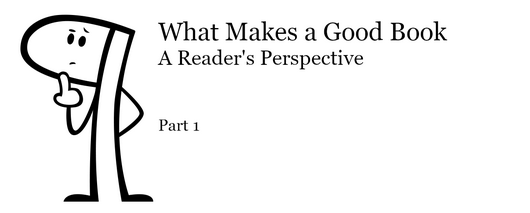
As I started this, I realized that there was no way that I’m going to be able to say everything I want to say now, so I guess this is going to have to be a series. I have no idea how long this series is going to be, and really where I’m going to go next, but I’m looking forward to finding out. This also gives me some wiggle room to improve this, after re-writing bits of this for a couple of weeks, it’s a strong entry in the “perfection is the enemy of good” category. I’m just going to post this today, or I’ll never finish it
A couple of weeks ago, as happens to even the most well-intentioned introverts, I met someone new. The one thing he knew about me going into this conversation was that I read a lot. Early on in our very entertaining conversation, he asked me the question, “What makes for a good book?”
We didn’t get far on that topic, sadly. I mentioned a couple of books to illustrate my first point and we went off on a tangent discussing one of those books. Which led to talking about another book and another, and then I don’t know, board games and another round for all of us at the table? And the question that sparked it all was lost.
The abandoned conversation has been percolating in my mind since then, so I’ve got to get some of it on paper.
Off the top of my head, there are four things that make a good book (I’m talking fiction here, there’s probably another list for me to make regarding Non-Fiction).
- I need a character or two that I can like/get invested in. That’s not to say they need to be likable characters, see Hannibal Lecter or Sand dan Glokta (or, just about anyone from The First Law trilogy).
- An engaging plot—sure, there are only 7 or whatever your favorite expert says, but I need one or more of them mixed well.
- A world I can dig into and believe—it doesn’t have to be a full-on bit of world-building like a Temerant or a Terminus. It can be Rebus’ Edinburgh, Bernadette Fox’s Seattle, or Walt Longmire’s Absaroka County. A place I can believe the characters live, breathe, and act in certain ways, where the plot can happen.
- This is the intangible one and the most concrete…the writing. I’m talking about the mechanics, the voice, the tone, the pacing, vocabulary, the technical bits. How does the writer deliver the other 3 aspects to the reader?
I guess I kind of see these as ranges—0 to 100, for lack of a better way of putting it. Any book worth reading will deliver all of these four points—not equally well. Some will have a great character, mediocre plot, and pay no attention to the world. That might still be a book worth reading—especially if they handle #4 well. It might even be a book that I’d relish recommending. But a great read is going do well on at least three of those—and a great one is going to knock it out of the park on all four.
Number 1 is my favorite and is the most reliable indicator (for me) of whether I’m going to enjoy a novel. Yes, it’s possible that I can not enjoy most/all of the characters and yet enjoy a novel if the author is good at most of the other aspects, but it’s not a given.
#2 is the least important to me—especially if the writer nails #1 and #4. But someone who masters it will make me forget about a lousy protagonist/antagonist or a dull style.
I think #3 is the hardest to be great at—I remember reading somewhere that the guitar is the easiest instrument to be competent at, and one of the hardest to master (or words to that effect). I think #3 is the guitar of novel writing.
#4 is the most vital—it can elevate any of the other 3—in fact, they can fool you into thinking an author has given you a great character, when they’ve really delivered something fairly two-dimensional, but describe them with such panache that you don’t notice. Another way to put it is that it will mask or augment the other three.
I think this’ll do for a start. I’m going to go deeper into each of these aspects in the entries to come (hopefully on a semi-regular schedule).
![]()



1 Pingback